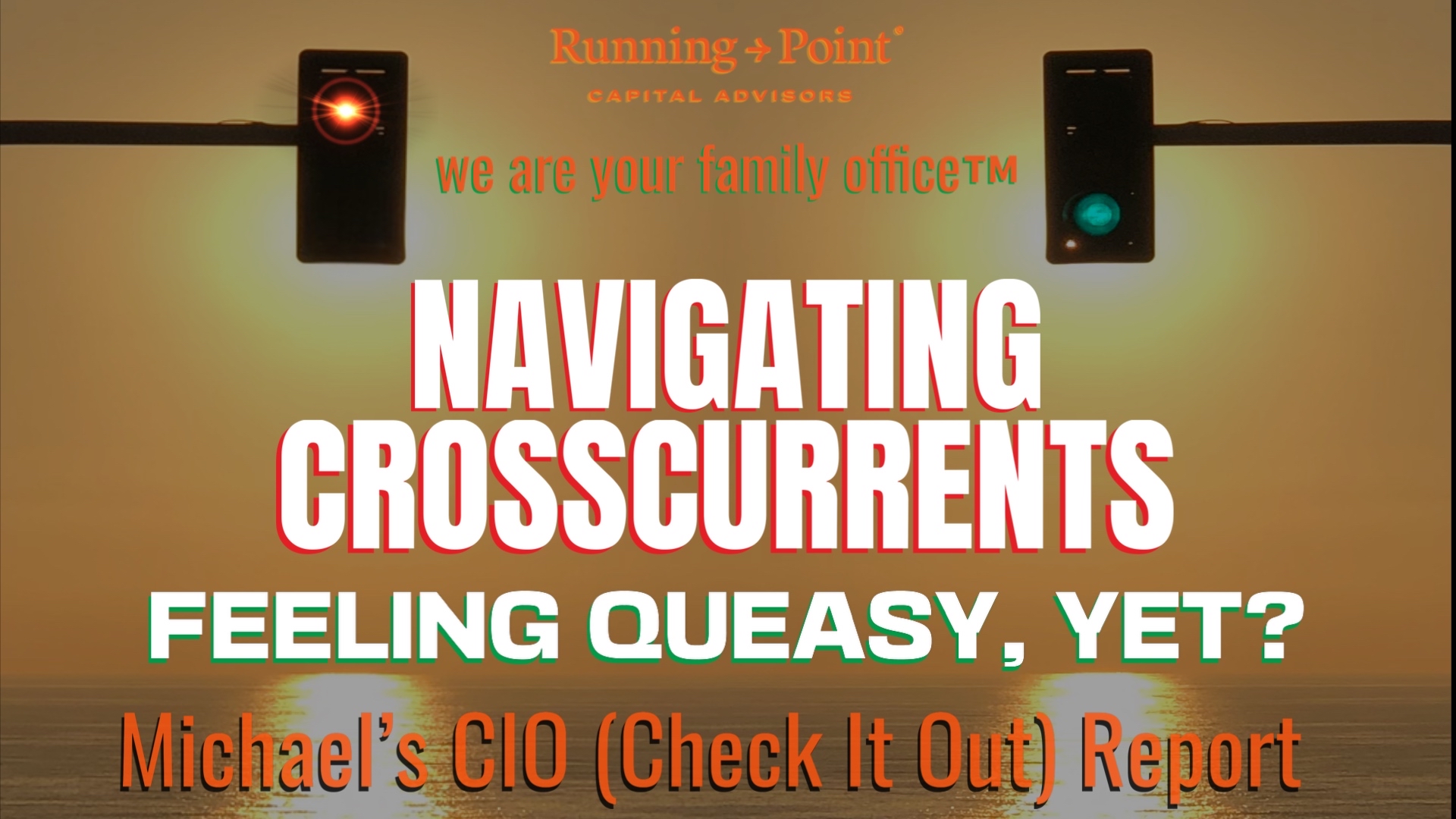Michael’s CIO (Check-It-Out) Report on the weeks just past — events, sarcasm, and global macro reflections
April 24, 2023

THEME: Debt to the Future
We have a special CIO (Check-It-Out) Report dedicated to one topic, the U.S. government’s looming debt ceiling crisis along with a smattering of ironically appropriate quotes from the 1985 movie Back to the Future.
- We are not yet out of time on the debt ceiling, but getting close
- Polar divisions between the Republican and Democratic Party could push a compromise to the brink or beyond
- If the government doesn’t pay off securities when they mature there may be few places to hide
- A U.S. government default could lead to financial crisis and ripple through the global economy
- Consider adding contingency clauses to any large purchase or sale agreement that may close around the time of a potential U.S. debt default
The mayhem that could come with a debt ceiling muck-up and default has been a hot topic here at our multifamily office (Running Point) since January and we’ve spoken extensively about it internally. The huge question is when exactly the U.S. runs out of money and when a possible default could occur. Looking at history—the tightening of financial conditions in 2011 when a similar showdown led to the US being downgraded—the potential “X” date when this comes to a head (which can be roughly calculated by measuring Treasury cash flows against all the resources available to the Treasury to meet its obligations) is probably somewhere between June and September, which is a broad date range. The “X” date might be on the earlier side of that range since tax receipts from much of the nation will be delayed till October because of disaster exemptions.
Marty McFly: “This is heavy!” ~~ Back to the Future (1985)
If the U.S. defaulted on its debt, it would mean that the government would be unable to pay back the money it has borrowed from creditors—individuals, institutional investors, and other countries that are bondholders—and it would have severe economic consequences. It would lead to a loss of confidence in the U.S. economy and dollar, causing interest rates to fluctuate, the value of the dollar to fall, and inflation to increase. It could also lead to a financial crisis and recession, as many investors and financial institutions hold U.S. government bonds believing they are a safe and reliable investment. Social Security, Medicare, and other government programs may temporarily halt until government payments resume. A default could also harm the country’s ability to borrow money in the future and increase the cost of borrowing for individuals, businesses, and local governments.
Doc Emmett Brown: “Great Scott!” ~~ Back to the Future (1985)
Trust and faith are universal currencies. A default would ripple throughout the global economy as other countries and organizations would lose confidence in the U.S. and be less willing to lend money in the future. The greenback would probably lose more of its status as a global reserve currency and the Japanese yen, European Union’s euro, and Chinese yuan would likely benefit.
Although the yield curve seems to be inverted because of recession fears, it is apprehension of a possible default in 3 to 5 months that has that part of the yield curve so elevated, i.e., it is the highest yielding part of the yield curve. If the government doesn’t pay off T-Bills, Treasuries, and agency securities when they mature there may be no place to hide. Corporations or entities that have securities maturing to pay debt and receivables might not have enough cash on hand! Money markets, which mostly invest in U.S. government securities, may not be able to meet redemptions without breaking the buck. Matured T-Bills, Treasuries, and agency securities would sell or trade at a discount because payoff dates would suddenly be indeterminate (i.e., anyone’s guess). Banks might not be able to wire out or return depositors’ cash because banks keep a lot of money in T-Bills (and repos on T-Bills) too. A debt default could make Silicon Valley Bank’s recent closure look like a cakewalk. Cash in your wallet or under the mattress would be accessible and maybe credit cards would work, but overall, our financial system might break down within a matter of days as many entities would be unable to make payments or honor obligations. Banks could try to swap credits and debits with each other, but that would get messy fast.
It’s possible that a default on U.S. debt could lead to a run on all banks. If investors and depositors lose confidence in the ability of banks to repay their debts and maintain the value of their assets due to the U.S. government’s default, they may withdraw their money from banks, which could lead to a shortage of cash and a decline in the banks’ ability to lend. This could lead to a further decrease in economic activity and a decline in banking system confidence (even though the banks would not be at fault).
The DeLorean’s vanity license plate: “OUTATIME” ~~ Back to the Future (1985) …not yet, but almost!
Money market accounts (MMAs) invest in a range of short-term, low-risk financial instruments, including Treasury bills (T-bills). The exact exposure of an MMA to T-bills will depend on the MMA’s specific investment strategy. T-bills are a common investment because they are highly liquid and usually considered very low risk. As a result, MMAs often hold a significant portion of their portfolio in T-bills but often also invest in government agencies (including GNMA, FNMA, FHLMC, FHA, FHLB, TVA, SBA, Farmer Mac, Farm Credit), certificates of deposit, commercial paper, repos, reverse repos, short-term corporate debt, municipal paper, and short-term foreign securities.
We have tended to use MMAs that only invest in U.S. government securities to avoid credit risk in our cash-equivalent asset class; although counterintuitive, we will probably stick with that because there is no telling what else will blow up if the government defaults. If that were to happen, it would likely be hugely credit negative and for most U.S. based securities as people sell whatever they can to generate cash. Most likely, the U.S. dollar would drop, the Euro, Yen, Pound, and Renminbi would appreciate, and gold and crypto would rally.
Normally the government would rectify the situation before the ultimate crisis, but the extreme polar divisions between factions of the Republican Party and Democratic Party could push things to the brink. Both political parties have dug in early. The Republican majority in the House aims to leverage the debt ceiling to force deep cuts to government spending while the Biden Administration has stated that they will not agree to mandatory spending cuts, nor will they negotiate under GOP debt ceiling threats. Both sides are probably calculating who will be blamed for the fiasco in next year’s elections if we go over the brink. The longer the delay, the more that such a crisis will be priced into securities.
Biff Tannen: “Hello? Hello? Anybody home? Huh? Think, McFly. Think!” ~~ Back to the Future (1985) …that’s what I keep asking, is anybody home in the House and Senate?
If default occurs, the consequences are so dire, it will probably be cleared within days, however the repercussions will be long lasting. The hope is that either the debt ceiling is raised in the 11th hour or the government implements another solution like having the Treasury mint a trillion dollar commemorative coin and deposit it at the Fed. Although technically legal, this solution has never been tried and could be contested.
If you plan to buy a house or make any other sizable personal or business purchase over the next several months, consider adding a contingency clause to your agreement that allows you extra time to close or reevaluate the deal in case funds become temporarily inaccessible. If you are selling an asset, similarly consider appending a contingency clause to your contract that protects your interests.
Dr. Emmett Brown: No! Marty! We’ve already agreed that having information about the future can be extremely dangerous. Even if your intentions are good, it can backfire drastically! ~~ Back to the Future (1985)…well, let me tell ya, we have information about the future😏
Historical side note: During the debt ceiling crisis in 2011, the U.S. government reached its legal borrowing limit, also known as the “debt ceiling,” and was unable to borrow any more money. This put the government in danger of defaulting on its debt obligations, as it would not have enough money to pay its bills and make interest payments on its debt. To avoid default, the government implemented spending cuts and used accounting maneuvers, such as the suspension of investments in federal pension plans, to free up funds to make payments on its debt. Additionally, The Congress and President Obama reached an agreement to raise the debt ceiling and avoid default. However, as a result of the crisis, the U.S. lost its AAA credit rating for the first time in history, which led to a spike in interest rates and caused uncertainty and volatility in financial markets. The crisis also highlighted the need for a more sustainable long-term fiscal plan for the U.S. government.
PERSONAL
In other news, the past several weeks have been busy for us:
QUOTES: We have been quoted by Reuters, CNBC, Fortune Recommends, and Benzinga regarding the banking crisis; by Barron’s about ChatGPT and artificial intelligence (AI); by Fortune and Wealth of Geeks for opinions on buying a home; by CBS regarding cash, CDs, and taxes; by Forbes concerning Twitter; by Reuters apropos corporate announcements from AMC Theatres and Buzzfeed, and by several other publications concerning credit cards, health savings accounts (HSAs), currency trading, and municipal bond funds.
PANELS: I’ve also had the pleasure of recently speaking at the CFA Society of Orange County’s Wealth Management Symposium with a distinguished panel of other CIOs as well as at Carmo’s US Institutional Real Estate Meeting West.
Make it a great week😊
Michael
~~~
Michael Ashley Schulman, CFA
Partner & Chief Investment Officer
Running Point Capital Advisors, your family office
“We deliver custom investment solutions, family office services, innovations, and unique perspectives to you and your family—we are your family office—you can emphasize your enjoyments, priorities, and legacy.”
Disclosure: The opinions expressed are those of Running Point Capital Advisors, LLC (Running Point) and are subject to change without notice. The opinions referenced are as of the date of publication, may be modified due to changes in the market or economic conditions, and may not necessarily come to pass. Forward-looking statements cannot be guaranteed. Running Point is an investment adviser registered with the U.S. Securities and Exchange Commission. Registration does not imply a certain level of skill or training. More information about Running Point’s investment advisory services and fees can be found in its Form ADV Part 2, which is available upon request. RP-23-45


